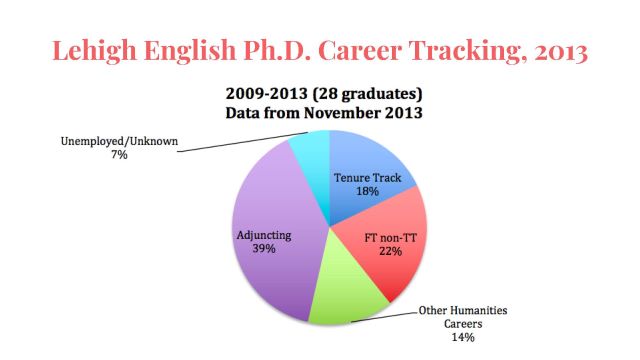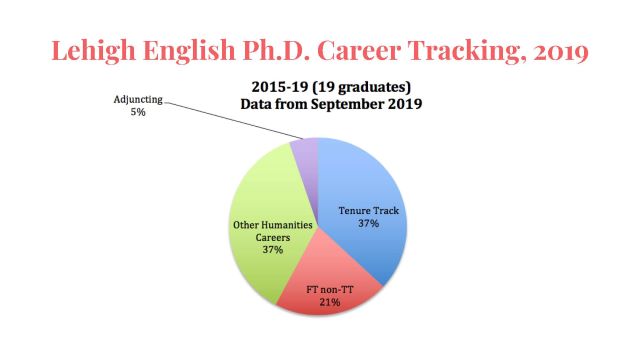- A combination of qualitative and quantitative data can help illuminate what graduates appreciate about their academic training and where they may need something different.
- Graduate programs can rethink what they offer based on what their students need and where their students end up. In fact, expanding the purview of graduate training can lead to more student success across all job markets.
- Pilots are a great way to introduce new courses/approaches, but they must be officially incorporated into academic programs in order to achieve durable and lasting change.
Lehigh University Graduate Program in English

In 2013, the English department faculty at Lehigh University began to look more closely at how their graduate students fared after completing their PhDs. The data revealed some changes in job placements. Historically, many of their graduates found full-time positions teaching at regional colleges and universities; but over the past several years, many more (nearly 40%) were landing in adjunct positions.
Led by Jenna Lay, a recently hired assistant professor, the department surveyed graduates to learn more. Graduates of the PhD program appreciated the undergraduate department’s commitment to “literature and social justice,” a shift in intellectual emphasis dating to 2009 that created ripple effects in the graduate program. But graduates also experienced gaps between their doctoral training and their postgraduate jobs. Like many graduate programs, Lehigh focused on research as the primary goal of PhD study. But this did not adequately prepare students for working at teaching-intensive institutions, nor did it prepare them for careers outside of the academy.

Based on this research, the department made a series of curricular and co-curricular changes to better prepare their students for a range of careers. In the curriculum, they developed a graduate certificate in composition and rhetoric focused pedagogically on the teaching of writing. They also created some one-credit courses, including a course on teaching developmental writing and a pilot course called introduction to graduate study. Other new courses included digital humanities and public humanities content.
The department also created opportunities for learning experiences outside of the classroom, including work at other campus offices and at community organizations. These opportunities took the place of teaching, so they did not create additional expectations. Importantly, however, students were allowed to keep their funding through the English department (as opposed to Graduate Assistant funding, which is less robust). Some of these partnerships came out of an NEH Next Generation Humanities PhD planning grant they received in 2016-17.
The results from these changes have been encouraging: students who take advantage of co-curricular opportunities and develop a range of work experiences have seen statistically significant success, while the percentage of graduates in adjuncting positions dropped dramatically (from 39% to 5%). Students are not only more likely to be hired into a range of nonprofit and industry jobs closely related to their interests but also more likely to be hired into academic tenure-track jobs.

For more on supporting publicly engaged work in humanities graduate programs, please see the ACLS report, Preparing Publicly Engaged Scholars: A Guide to Innovation in Doctoral Education.

